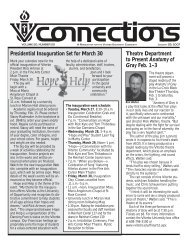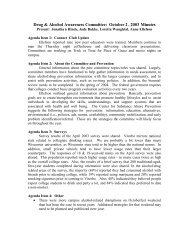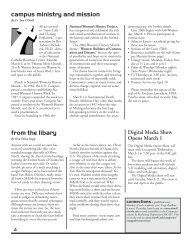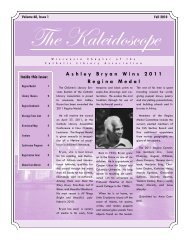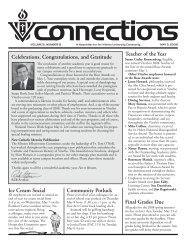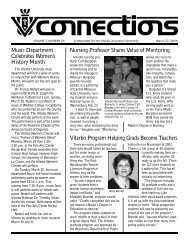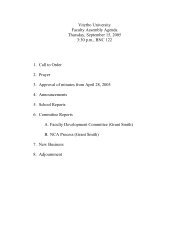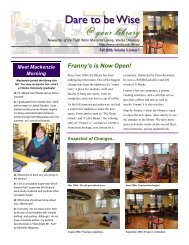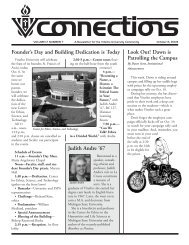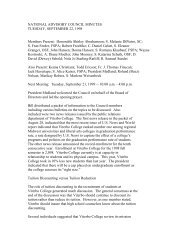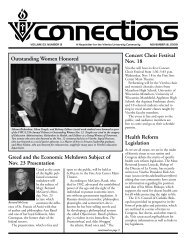Create successful ePaper yourself
Turn your PDF publications into a flip-book with our unique Google optimized e-Paper software.
<strong>Viterbo</strong> <strong>University</strong> Curriculum Committee Meeting Minutes<br />
November 8, <strong>2001</strong><br />
Present: Amy Gleason, Kim Fredricks, Ed Rushton, Rich Maresh, John Nebeck, Tim<br />
Schorr, Pat Wessels, Wayne Wojciechowski, Rich Maresh, Keith Knutson,<br />
Ed Wenzel, Rolf Samuels<br />
Absent: Jack Havertape, Pat Zander<br />
I. We approved the minutes of the October 10 meeting.<br />
II. Michael Lauer proposed that BIO303 (Ecology of Belize) be granted a diversity (D) and<br />
environmental (E) overlay. Discussion followed.<br />
BIO303 is a three-credit course, one credit of which students earn in the spring semester, two<br />
credits of which students earn during 14 days of fieldwork in Belize in May. The trip was<br />
offered once before as part of BIO 161 and as the lab portion of CHEM 470. The ecology angle<br />
of the course asks that students compare the ecology of Belize with that of Wisconsin. Michael<br />
said that the course’s diversity component lies in student interactions with native cultures—in the<br />
field through interaction with Belize guides, in the town through interaction with Creoles,<br />
Mayans, etc. The course discusses ecotourism and sustainable agriculture, both of which ask<br />
students to look at the particular culture of Belize. Students keep a reaction journal during their<br />
time in Belize.<br />
When Pat raised a question of how student learning about diversity might be measured, Michael<br />
said that such insights are recorded in the journals, though he could stipulate a portion of journal<br />
entries that could be dedicated directly to diversity.<br />
Rich wondered about diversity requirements in other courses. Nothing in the college catalog<br />
establishes exact standards, although the catalog does list particular courses that qualify for D<br />
and E overlays. Pat wondered if courses with both designations ought to balance those two<br />
elements. Kim then circulated CC procedures that showed how instructors should submit<br />
courses for D or E overlay approval. Those procedures spell out six kinds of courses that qualify<br />
a course for a diversity overlay and three criteria that sanction an environmental studies overlay.<br />
These procedures also showed that all such proposals first require the approval of the department<br />
chair and the school dean. Michael agreed to secure this approval and resubmit his proposal to<br />
the CC.<br />
Overall, the committee agreed that the ecological angle of the course was easy enough to<br />
approve, but we wanted a better course instrument to measure how well students interacted with<br />
the diversity of the Belize culture. Michael agreed to present us a revised syllabus at our next<br />
meeting, one that incorporated such measurement.
Pat turned discussion to the measurement of diversity in all such designated courses in the<br />
catalog. What ensures that these courses still qualify as diversity courses? Rich said that the<br />
initial designation of D status came from the ad hoc committee that approved general ed<br />
requirements some five years ago. Pat suggested that we ask departments to revisit which<br />
courses warranted diversity overlays. The CC could develop a form that departments could use<br />
to support the diversity legitimacy of their D courses.<br />
III. We agreed to meet for the last time this semester during finals week, Monday, December<br />
10 at 9:00. Ed will check on the continued availability of the conference room. The<br />
meeting adjourned at 4:22.<br />
Respectfully submitted,<br />
Rolf Samuels<br />
Recording Secretary<br />
cc: Michael Lauer<br />
Sr. Georgia Christensen<br />
Todd Wehr Memorial Library
<strong>Viterbo</strong> <strong>University</strong> Curriculum Committee Meeting Minutes<br />
10 Dec <strong>2001</strong><br />
Present: Amy Gleason, Kim Fredricks, Jack Havertape, Keith Knutson, Rich Maresh, Ed Ruston,<br />
Rolf Samuels, Tim Schorr, Ed Wenzel, Pat Wessels, Wayne Wojciechowski, Pat Zander<br />
Absent: John Nebeck<br />
The committee was called to order at 9:07 a.m.<br />
We approved the minutes of the 8 Nov <strong>2001</strong> meeting by a 10-0 vote. The motion was made by Pat<br />
Wessels and seconded by Kim Fredricks.<br />
The main agenda item for this meeting was to have been the approval of the Diversity and Ecology<br />
overlay status for BIO 303 (“The Ecology of Belize”), but the additional materials the committee had<br />
requested (see 8 Nov minutes) were not yet available, so this item was tabled until sometime in the<br />
coming semester.<br />
We then began a discussion of the issue of student re-entry to <strong>Viterbo</strong> after an academic leave of absence.<br />
There is a case of a student in the Marshfield area who has been taking courses in the RRN program when<br />
they become available in her area; she has taken many courses in her major area (BIS) and is essentially<br />
trying to finish her general education courses. The problem is that when no appropriate course is available<br />
locally in a given semester (it might be a nursing course or a course she has already taken) she has to<br />
“drop out” (or “stop out”) and then go through the re-entry process to take further courses, which requires<br />
filling out a form and paying a nominal fee ($20). So it has been suggested that we might be able to make<br />
this process easier by not requiring re-entry, at least under some conditions.<br />
Pat Zander said that the catalog is also an issue – if a student “stops out” for a while, a semester or a year<br />
or two, and then decides to resume the program, should she be forced into the current catalog? This can<br />
create a moving target situation.<br />
After considerable discussion of these matters the committee decided to have Jack and Amy do a little<br />
looking around to see what other schools do in this regard and to then consider some sort of proposal in<br />
the spring semester.<br />
The meeting adjourned at 9:45 a.m.<br />
The schedule for the next semester will be determined in January.<br />
Respectfully submitted,<br />
Rich Maresh<br />
Recording Secretary
<strong>Viterbo</strong> <strong>University</strong> Curriculum Committee Minutes<br />
February 14, <strong>2002</strong><br />
Present: Kim Fredricks, Amy Gleason, Jack Havertape, Rich Maresh, John Nebeck,<br />
Ed Rushton, Rolf Samuels, Timothy Schorr, Ed Wenzel, Pat Wessels, Wayne Wojciechowski,<br />
Pat Zander<br />
Absent: Keith Knutson<br />
Ed Wenzel called the meeting to order at 3:30 p.m.<br />
The committee approved the minutes of the January 17 meeting.<br />
Agenda item 3: allowing students to take academic leave without having to reapply for entry or<br />
transfer into a new catalog. Because off-campus sites do not offer general education courses on<br />
a regular basis, students at these locations may not be able to enroll every semester and are<br />
forced to pay a $20 processing fee and change to the current catalog each time they reenter.<br />
While it is the students’ responsibility to inform the <strong>University</strong> when they plan to reenter,<br />
currently there is no distinction between a “leave of absence” and simply dropping out of school.<br />
Jack Havertape proposed the creation of a leave of absence policy that would exempt students<br />
enrolled in off-campus programs, or those who need to take a year off from school for medical or<br />
other reasons, from paying the $20 reentry fee or changing to a new catalog. Discussion: (1) the<br />
question of who will keep track of students granted a leave of absence, (2) the length of a leave<br />
of absence, (3) the advisor’s role in the process, (4) the leave of absence policies of other<br />
institutions, (5) how students will be informed of a leave of absence policy. The proposed policy<br />
would be similar to those at other institutions, as compiled in a handout by Amy Gleason. Jack<br />
Havertape offered to keep track of students granted a leave of absence through his office.<br />
During exit interviews with students who are leaving school, Wayne Wojciechowsi may be able<br />
to help identify those students who want to apply for a leave of absence. The <strong>2002</strong>-2003 Student<br />
Handbook and the next <strong>University</strong> catalog would articulate the new leave of absence policy.<br />
Jack Havertape made the following motion: “Students may apply for a one-year leave of<br />
absence with the Academic Vice President. Students who receive such a leave will not be<br />
responsible for the reentry fee and can remain in the same catalog, provided they return within<br />
three academic semesters.” The motion passed unanimously.<br />
Agenda item 4: investigating methods for making graduation checks more efficient and timely.<br />
Currently it is the responsibility of the advisor to ensure that students have completed all<br />
requirements for graduation. Amy Gleason suggested the need for a third party to do a final<br />
credit check while still respecting the role of the advisor. Consensus was that advisors would<br />
welcome help in making sure that students fulfill all graduation requirements. Discussion: (1)<br />
the question was raised of when a final credit check would occur and who would it, (2) a concern<br />
with transfer students not having enough upper-division credits to graduate. Amy Gleason<br />
offered to monitor the anticipated graduation dates on degree audit sheets and to complete a final<br />
credit check when students have earned 80 credit hours, or before 115 credits for extendedlearning<br />
students. She will include a list of unmet requirements with the registration materials
that she sends to each advisor. This process would typically occur at the Junior II level, just<br />
before the student’s final two semesters.<br />
Additional agenda item: the proposed approval of BIO 160 as a General Education course.<br />
This course is currently closed to all students except biology majors. The proposal would allow<br />
all students to take the course in fulfillment of the General Education requirements. Discussion:<br />
(1) the Chemistry Department already has a similar policy, (2) the School of Letters and Sciences<br />
Chairs Committee has approved the change, (3) biology majors who subsequently change to<br />
another degree program could count BIO 160 as a General Education course rather than having<br />
to take a lower-level course, such as BIO 100, to fulfill the requirement.<br />
Pat Wessels moved to approve BIO 160 as a General Education course. John Nebeck seconded<br />
the motion. The motion passed unanimously.<br />
The meeting adjourned at 4:29 p.m.<br />
Respectfully submitted,<br />
Timothy Schorr<br />
Recording Secretary



